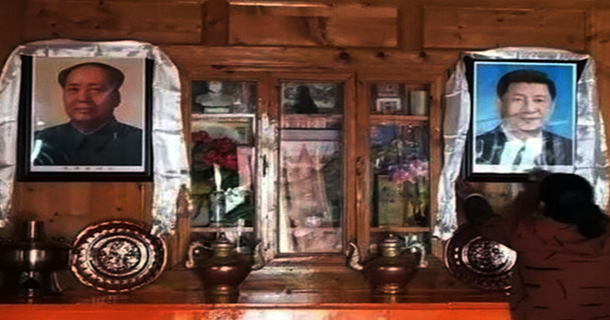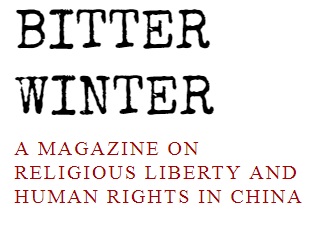Tibetans living in the Tibet Autonomous Region (TAR) are now required to make offerings to pictures of Chinese President Xi Jinping and other party leaders and not to Buddhist images as they do at present, reports the International Campaign for Tibet in a new report published on January 15. Chinese authorities in the TAR are upgrading their stance against His Holiness Dalai Lama. TAR Chairman Che Dalha (Chinese: Qi Zhala), speaking at the meeting of Regions Party Congress on January 11, said, “Tibet has firmly curbed and cracked down on secession, infiltration and sabotage activities by hostile forces at home and abroad”.

Photo: La Croix International
ICT quotes sources from Tibet as reporting that the authorities have ordered Tibetans in receipt of the “poverty alleviation” subsidy from the government to remove pictures of His Holiness the Dalai Lama from their homes and to destroy their alters. Another source has said that new housing allocated to Tibetans who were being relocated in settlements was equipped with small altars already set up with images of Chinese party leaders. Low-income families are reported as having no choice but to follow these edicts rather than risk losing their government subsidies.
The ICT report also notes a massive thangka (a Tibetan Buddhist religious painting) of Mao Zedong has been created at a cost of more than 4 million yuan (US$500,000 / £390,000) and involving over 12,000 people in its construction. The report quotes the Chinese state media the Global Times as saying that a proposal had been made to build statues of officials deployed in Tibet “throughout history” – including the Chinese Ambans sent during Qing dynasty in 1727 – in other words, when Tibet was a free and independent country.
Mr Sonam Norbu Dagpo, a Central Tibetan Administration spokesperson, has condemned the actions of Chinese authorities in Tibet saying, “The Communist Party of China claims to be an atheist government and China an atheist country. Compelling the Tibetans in Tibet to prostrate to pictures of Chinese leaders including that of Xi Jinping is not only inappropriate but such intervention going against the Tibetan culture and Buddhist tradition is unacceptable.”
 Bitter Winter, a new online magazine based in Italy and reporting on religious liberty and human rights in China, says they interviewed a number of Tibetans living in Lhasa who say their livelihood depends on subsidies since their land was confiscated by the government, and they fear for their survival in the face of poverty if they do not comply with these latest requirements. Bitter Winter says, “This new order represents an escalation of the historic policy of the Chinese Communist Party to persecute Tibetans and to force them to abandon their religious beliefs”.
Bitter Winter, a new online magazine based in Italy and reporting on religious liberty and human rights in China, says they interviewed a number of Tibetans living in Lhasa who say their livelihood depends on subsidies since their land was confiscated by the government, and they fear for their survival in the face of poverty if they do not comply with these latest requirements. Bitter Winter says, “This new order represents an escalation of the historic policy of the Chinese Communist Party to persecute Tibetans and to force them to abandon their religious beliefs”.




 Print
Print Email
Email